The Value-Laden View of Life
Naive science-aficionados will often think of observation as the ultimate arbiter between rival scientific theories. Their view holds that observation is theory-neutral - it is objective - and therefore ideal in deciding between rival theories.
Theory-ladenness, on the other hand, states that observation is not theory-neutral: it's - wait for it - theory-laden!
So take this datum for instance:
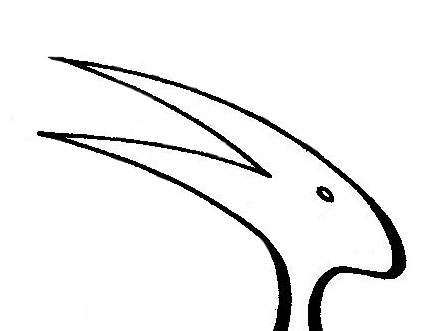
Theory-ladenness states that, depending on your background knowledge, or the theory from which you view the datum, you might view it as an antelope or a pelican. People who support the antelope-theory might view the datum as follows:
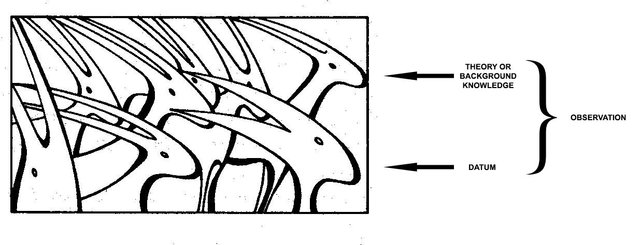
People who support the pelican theory might see it like so:
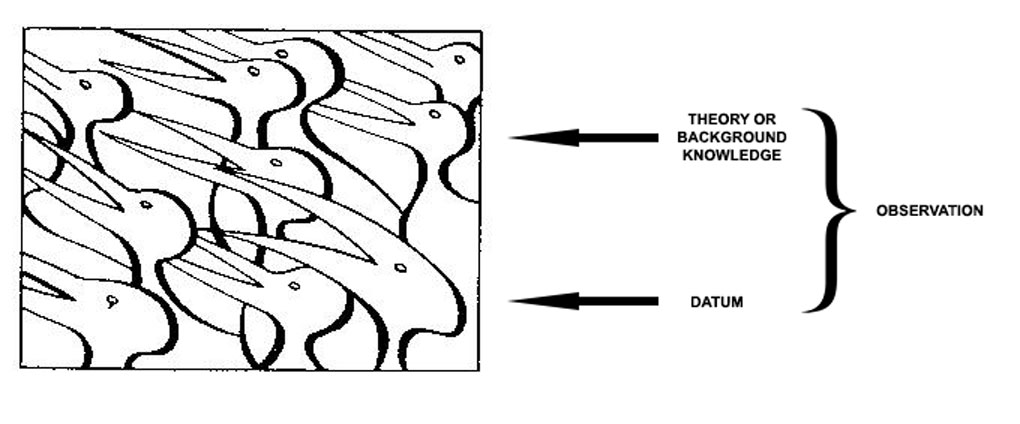
Note that only the "background knowledge" (or theory) differs: the datum in both pictures is the same. Here, let me darken it for ya:

So the observation cannot decide between the two theories, since the theories decide what you observe. This is what in philosophy of science is called incommensurability.
Can objectivity in science be salvaged? Of course. But this is not the subject of this post!
What's all the preamble?
In my 2011 book, I took the philosophy of science's theory-laden view, re-baptized it as the value-laden view, and applied it to all of life. The appropriation of the term wasn't so much a matter of similarity, as it was an effort to tie a novel idea to something well-known in order to lend the former more credibility.
Following are some areas in which the value-laden view of life can be applied.
The value-laden perception of life
You have to view something as useful before you can see it. For instance, you can only perceive a rock if you are thinking of it as something that you might trip over, or as something that might be used to help build a stone wall, or as something out of which a statue can be carved, etc. You cannot perceive an object unless it is through at least one guiding value. If an object cannot be used in any way, then it is very likely that, for us, it will not even exist: since there would be no evolutionary benefit in perceiving this object, there would be no evolutionary pressure to perceive it.
The value-laden psychology of life
Suppose I have a desire (a desire for food, say), and I perceive an object that will satisfy this desire (an apple, say). It is a psychological given that people do not reason as follows: "I am hungry. This apple will satisfy my hunger. Therefore I desire to eat this apple." Nor is it the case that a desire seizes you as soon as you complete a similar line of reasoning. Rather, a desire seizes you as soon as you perceive the object. Further, other mammals have minimal reasoning capacity, and yet they desire food just as much as we humans do, if not more. If objects are perceived through our values, that would explain the instantaneous nature of desire. Our values paint the objects of our perception, and by the time the objects have reached our consciousness, the paint has already dried. Reasoning only occurs as an afterthought, or when there are conflicting desires or insufficient data. The value-laden theory of life explains why in real life the objects are seen as desirable, rather than reasoned as such.—Most often, a thing's desirability is perceived, not deduced.
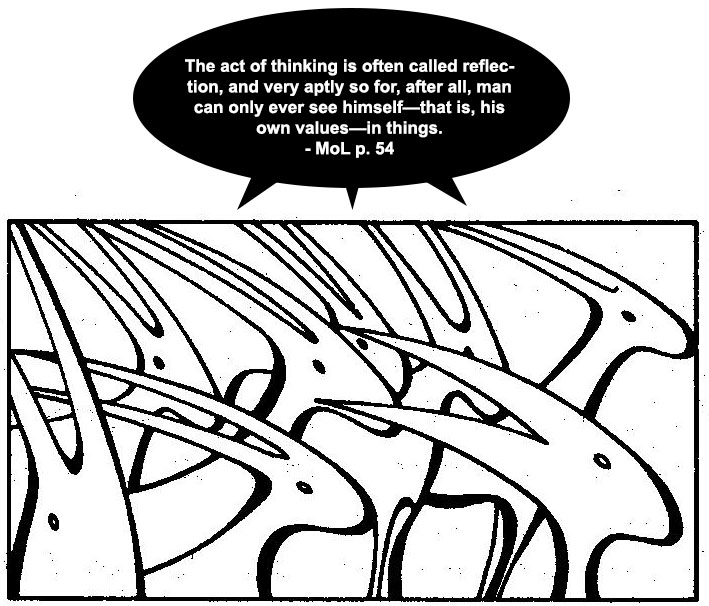
The value-laden language of life
Are there any terms that are purely descriptive? Are not all words accompanied by a quantum of approval or disapproval? If it is true that a human being cannot subsist without values, then can he ever use terms that are purely descriptive? Instead, it seems to me that a word would not even have meaning for a person unless he assigned a value to it. A word that is merely descriptive is incomprehensible.
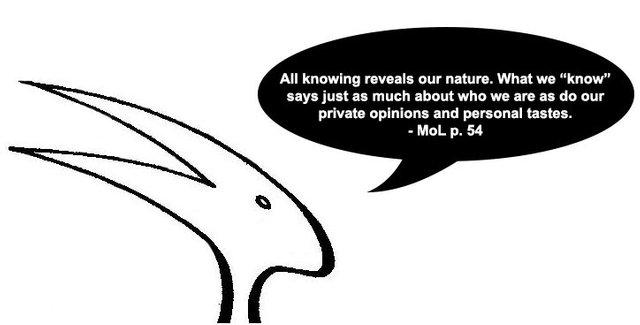
The value-laden public language of life
Because language is shared, it represents a middle ground, a compromise, between different values. For this reason language alienates us from our values. To some extent we are always in conflict with our language, precisely because it does not make our values a matter of self-evident tautology. “Murder” is to an extent synonymous with “wrong.” But “atheist” is not understood by everyone in the same way, which causes friction. But aside from these rare cases, because we use the same words to communicate, our differences often go unnoticed. Because language is to a large degree neutral between different human values, it is thought to be neutral between different values period, and therefore it is thought to be objective. But since a language can only exist in creatures who share some common set of values, language cannot be objective.
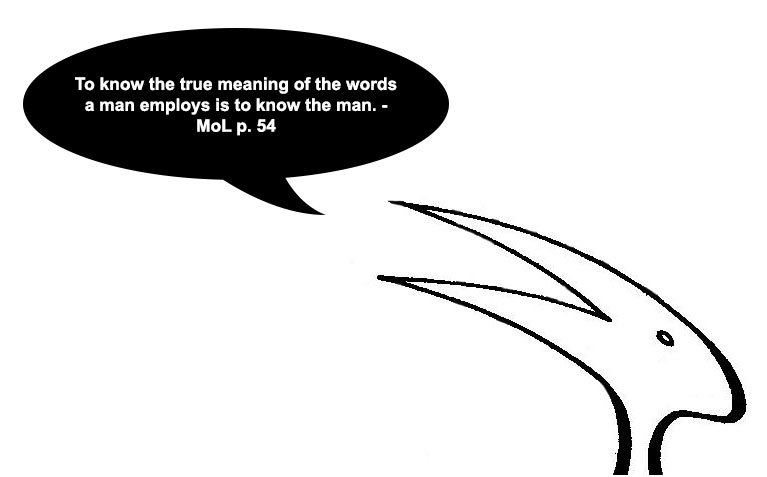
The curtain falls
This completes the 7th installment of the Meaning Of Life series. In case you missed the other episodes:
Part 6: I Am Therefore I Harm
Part 5: Nietzsche vs Christianity: Are Christians Nihilists?
Part 4: Can we desire death?
Part 3: Are nihilists being honest when they say life has no value?
Part 2: Does death make life meaningless?
Part 1: Is it possible to be a nihilist?
Next episode will be titled 'Against Subjectivism' - just in case you thought any of the above meant reality is up for grabs!
Let's end this by adding some playful color to this monochromatic post!

False. A pregnant woman desires specific nutrients thus they might crave a weird food that has them at 2.am at night without even seeing the object.
Similarly, animals that are deficient of minerals "magically" get attracted to specific kinds of rocks and start licking them.
A cat without learning from anyone will lick itself to clean. It will rub itself against a human to get what it wants. It will wrestle playfully with your hand much like it is another cat. These are instincts governed by nature's autopilot.
Every living body is made up of cells that need specific fuel to function. Every single desire, every single nutrient stems from their functions. Our perception is nothing than the overall aftermath of that process.
If a pregnant woman desires to eat ice-cream, from her friends point of view she desires something sweet. From her body's point of view she needs to regulate her insulin. Subjectivism suggests that there is no external or objective truth because we are all observers of a multifaceted process. There is no single objective endgame. It cannot be or exist since everything in the universe changes. For objective truth to exist the entire universe will have to stay still. What was objective truth 10 billions years ago for gravitational forces in our solar system, are not today and will not be 10 billion years from now.
That's from here.
Doesn't really matter though, I'll assume you're right (and you may well be, I haven't read anything else on this subject other than that). What you did basically was give a causal or physiological explanation for why certain needs arise. I wouldn't argue against any scientific explanation like the one you just gave.
In fact I say elsewhere that our values arise partly from our genes, roughly speaking, and partly from our environs.
So basically your scientific explanation can coincide with my "values" explanation. In fact, our values must come from somewhere! They're not just created out of thin air. We value X because our body needs X (or whatever other scientific/causal explanation you may care to mention). The scientific explanation just shows why values exist, just as genes would have showed Darwin (if he had lived to see their discovery) why, or how, his theory works.
So, for instance, instincts show why we value certain females above certain other females, or certain foods above certain other foods. As soon as I perceive a certain female, she already possesses a value for me: she arrives to my consciousness already "painted" as, say, a sexual object, or an object that can mother my children, just like she arrives similarly "painted" to the lion's consciousness, dressed in gravy, with an apple stuck in her mouth, ready to be eaten. She literally appears differently to me and to the lion, because we perceive her through our value-specs, that we can never remove. The scientific explanation for why those value-spectacles are the way they are can be whatever you want it to be, it won't clash with my view.
There is no such point of view! Just like there's no "from the rock's point of view" or "from Natural Selection's point of view" or "from the Universe's point of view". It's just us projecting.
Subjectivism should better be left for the next installment.
I know you don't share this view, but to me (and many others) consciousness is just baffling. I just don't understand why, say, the woman in your example, who craves ice-cream, must crave it. Why doesn't she just seek it out like metal shards seek out a magnet? Why doesn't she go to the fridge and pick up a container and dip her spoon in and eat ice-cream just like a wound-up toy soldier moves forward? Why does she need consciousness to do all that? The toy soldier doesn't crave to go forward: it just does. At which point during evolution did Nature say "fuck it, I can't do all this by myself! it's too complicated to do it mechanically! I must enlist the help of Consciousness!" I don't understand why consciousness exists, especially considering that our choices are made for us before we're even aware of them. Some philosophers say consciousness is an epiphenomenon. But that still doesn't explain why it's here.
I never brought consciousness to the discussion. Consciousness is bullshit. I am just saying that each individual sees thing from a different angle depending on his unique aggregate of different life experiences/lessons.
basically this but add a couple thousand more versions. (or more)
Yeah it's just the way you differentiated between let's say 'what the person wants' and 'what his body wants', and tried to collapse the former into the latter, brought up in me the thought of consciousness, which I think is a more interesting issue, and thought I'd might ask you how you see consciousness - specifically, why aren't we as unconscious as rocks? Why does 'complexity' have to give rise to consciousness? Etc. It seems to me what you're doing is what the logical positivists were trying to do: whatever question they didn't like, they said it was 'meaningless' (literally the words had no meaning). They did this with questions such as 'does God exist?' and 'what is the meaning of life?' It seems to me you're doing the same but using the word 'bullshit' instead of 'meaningless statement'.
I understand the pic and it's actually how I view subjectivity/objectivity. I.e. there is in fact objective truth! (it's being pointed at with the bottom arrow!)
I gave a simple example of subjective perception. I could given smaller comparisons but I wanted to make a point about how non-objective the world is.
Because our bodies are able to carry electrical signals. It gives random variation to our carbon molecules.
it doesn't. consciousness is a just a subjective narrative for those signals.
everything IS meaningless. Life has no meaning. It just is. Meaning is simply a narrative, a story, hence why our species likes them so much and why motivational speakers bust our balls with them.
they are meaningless. i know you are trying to defend your book and that there is no such thing as a "nihilist" but you need to get over it. You can continue being without finding any meaning because your body is much different than your "narrative" process. You realize that when you try to close your mouth and asphyxiate yourself .
Wrong. lol. the point is that this picture is part of another picture, that is part of another picture. This is why you see so many fractals in nature that slowly take other shapes as you step back and as time progresses.
Also remember that being a philosopher means accepting one's mistakes. You are too stubborn.
I always admit my mistakes!
Right back at you!
I may disagree with this, but at least I know what you mean. I don't know what you mean when you say the following:
It's like you're basically saying that consciousness is an illusion. Like I'm just dreaming I'm conscious. In reality I'm just like a rock, but somehow I've fooled myself into thinking I'm conscious. It's like you're showing me one of those pictures they use in psychology to show how our eyes fool us sometimes, and you're telling me "you think you are seeing X, but actually you're just seeing Y".
There are philosophers who share your opinion, like Daniel Dennett, but then again he's the guy who believes free will exists. And that our actions are 100% determined. Go figure.
Anyway maybe I should try and write something about consciousness in the future, but it's gonna take a while.
yes. Consciousness is for the most part an illusion and there are pretty good evidence for this. Even in times we think we get it all "clear" our past experiences are so full of false concepts and perceptions that make the current experiences complete delusions (not just illusions). Consciousness is based on memories and past experiences. If memories are mostly made up shortcuts, mixed up with dreams and false perceptions (i will let you google it) then the sheer clusterfuck of the sum of all people's beliefs become nonsense.
As a "philosopher" you shouldn't make these logical fallacies. I am an atheist, Stalin was an atheist, therefore I support mass killings? :) come on. don't let me catch your leg that easy.
"For the most part", you say, so I would ask about the part that remains. I'm aware of all the ways our minds trick us, but that's a different question. There is one thing about which it's impossible to be wrong - the one thing in the world we're certain about - and that's that we exist. That's what Descartes proved with his famous line (there's a whole passage and a whole book wrapped around that single line), even though it's fashionable sometimes now to challenge it, but really no one could ever prove him wrong without contradicting themselves. I could be a brain in a vat, you could be a robot, this could all be happening in my mind or in a dream, I could have been created just a millisecond ago and all my memories could be implanted - but there's one thing I can't be wrong about: I AM. (And by that, we mean consciousness, we mean our qualia to use the philosophical term.)
Let me rephrase that for you. "Alex is a philosopher. Therefore he should be very aware of this fallacy - just because Dennett is wrong about one thing, doesn't mean he's wrong about another thing. Therefore, it's reasonable to assume that Alex wasn't making that fallacy. If that's true, then what else could he be trying to illustrate with that paragraph? Maybe he was trying to say 'There are great philosophers who share your opinion. But don't get all jolly just yet: just because they're great doesn't mean they're right. After all, the same philosopher, despite his greatness, is a compatibilist about free will.' Yes, that seems like a far more reasonable interpretation."
Or maybe, even better: "That was just a side-thought, after all Alex always tends to talk too much."
(I am also aware the fallacy of which you have accused me is a different one than the one I used in my rephrasing.)
[I'm having an almost identical discussion in another post and I thought you'd love to read @heretickitten's response, which is like your own, and I love the way it's worded:]
No, I'm saying that consciousness doesn't really exist. The illusion is just a bubble surrounding a machine.
We are already living in the illusion. What IS consciousness? It's hard to define, right?
It's just the idea of taking in sensory information and processing it, isn't it?
It's mechanical and stilted. Smarterchild, that old chat AI, is like the most thin bubble. A few words, and you realize it's just a machine. Pop.
Cleverbot is a bit better, the bubble of consciousness illusion is thicker. You might be fooled for a bit. Even it might be fooled, from its own perspective. But with prodding... Pop.
Introduce: The Human Machine. Me or you.
How mechanical are we? Of course it seems complex, just complex enough to fool us into thinking we're free-willed or something, or that we're not a machine. But we can't see the code that we're running on. The system architecture is too complex to fully comprehend.
Yet, it is still a machine. That means our consciousness is just another bubble, and if poked enough, it could pop, revealing that we are just mechanical beings, and that the real pilot is our genetic code. Not the brain.
Pop.
Upvoted and Resteemed by xx-votesplus, the dropAhead curation team! Want more earnings? Join @dropahead in Streemian https://streemian.com/profile/curationtrail/trailing/396, or delegate/donate some STEEM POWER to @dropahead!
Please upvote this comment! We will earn more STEEM POWER (SP) to give you more earnings!
Keep up the good work!
Most recent post: First 7 weeks of xx-votesplus: YOUR dropAhead Curation Team!
Very well written and insightful. Will need some time to mull this over.
However, my first quick thoughts.
I do think it's possible to be purely descriptive. A car can be described as "a wheeled motor vehicle used for transportation". This adequately describes all kinds of possible cars. You could however argue that the need of the description"for transportation" says something about our values around what a car should be. But that seems backwards to me.
Also, it is always possible to describe things by exclusion. "White is not black." However, your value-laden argument creeps in here too: why choose "black" instead of, for example, "red" in that description?
Very torn on this one...
An organism too big to be transported by a car and that can use it as food (can digest steel and rubber) would describe it rather differently. What you have described is one of the car's possible uses, but in order to see that use you have to first ask the question: "how can I put this object to use so as to best serve my interests/values?" Not that you ask this consciously, of course. It's just that any possible use of the car emerges only when viewed through your value-spectacles.
You said all this yourself in different words, which makes me very glad cos it means you actually get what I'm saying! My views are rather idiosyncratic so it's sometimes hard for people to understand them.
Also (because maybe the reason you're trying to salvage description is because you're trying to salvage objectivity), note that the idea that objects can't be described purely descriptively doesn't mean there can't be any objectivity. To me, an object is (objectively) the sum of all its possible uses. So when you view the car as a transportation vehicle, you're viewing part of its objective reality: part of its many possible uses. A chair is home and food to a termite; firewood, weapon, and seat etc. to you. Add together all the possible ways a chair can be used, and you got the full and objective description of what a chair really is. More on that in the next installment!
Very fascinating observation! Your post remind me of linguistic determinism in shaping a society's culture and values. Samuel Delany's "Babel 17" had similar anecdotes to your last quote from MOL. Something to he effect of: if we can erase an individual's personality and gift him with only technical language, he would inevitably become a mechanic or engineer. Linguists argue whether language determines thoughts or thoughts determine language, but I'd add that to your value-laden perception matrix that language is not neutral, as it too can shape a person's thoughts.
Well my view is that it's both. You're necessarily born in a culture that already has a value system encoded as words, so the word "woman" for example has a certain specific meaning that females must subscribe to and fashion themselves after, but at the same time feminists have managed to unveil that hidden meaning, and challenge it. So, in other words, a powerful individual or group, can give his own meaning to words. Essentially, words are like anything else in life: they are swords, war vehicles meant to carry our values forward. We are both influenced by them, and influence via them. Generally, I think language is to a large degree just another expression of our 'will to power' let's say. If I may exaggerate: when people talk, what you hear is their values doing battle.
I've added Babel 17 to my amazon wish list. Looks very interesting!
It is very interesting that you reference "woman" having specific meaning. It derives from "wife man," so the very word necessitates reference to "man" to have any meaning. I agree that words are weapons far more dangerous than any man has invented to this day. I recall a scene from "Conan the Barbarian" (1980s version) when James Earl Jone's character educated Arnold about the true meaning of power: "What is a sword compared to the hand that wields it?" and he commands one of his followers to jump to her death.
There is also a fascinating psychological experiment that used perception to control psychiatric patient population. Essentially, the staff cordoned-off an area of the cafeteria as being "reserved" for well-behaved patients. The patients earned tokens for good behavior that they then could exchange for a seat at the "reserved" section. Apparently, the experiment worked very well in patient behavioral control.
It a sense, the "society" that we live in are just collection of unchallenged assumptions. Our unconscious agreements make our reality possible; undermine the assumptions in symbols and tradition, then the entire edifice of society crumbles.
Collaborative subjectivity maybe? ;)
I sent you a private message!
I got no messages on discord or steemit chat!
Hmmmm. Do you have busy?
No. .. Can't you use steemit chat or discord? My username is the same in both. Although on discord I think it's with a space not a dot.
I like this philosophy of perspectivism. I wrote some articles about it too. Upvoted and followed.
Congratulations! This post has been upvoted from the communal account, @minnowsupport, by Alexander Alexis from the Minnow Support Project. It's a witness project run by aggroed, ausbitbank, teamsteem, theprophet0, and someguy123. The goal is to help Steemit grow by supporting Minnows and creating a social network. Please find us in the Peace, Abundance, and Liberty Network (PALnet) Discord Channel. It's a completely public and open space to all members of the Steemit community who voluntarily choose to be there.
If you like what we're doing please upvote this comment so we can continue to build the community account that's supporting all members.
Congratulations @alexander.alexis! You have completed some achievement on Steemit and have been rewarded with new badge(s) :
Click on any badge to view your own Board of Honor on SteemitBoard.
For more information about SteemitBoard, click here
If you no longer want to receive notifications, reply to this comment with the word
STOP:)